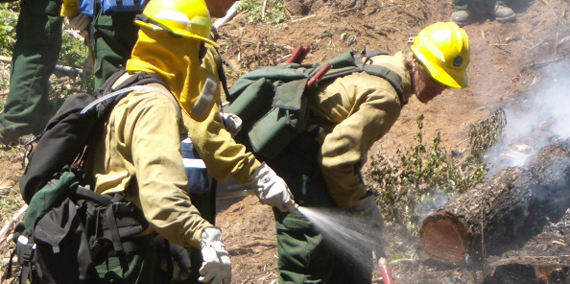Fighting Fire

Before lighting fire, please check for any local burn restrictions.
Resources for Fighting Wildfires
DNR is Washington state’s wildfire fighting force, with more than 1,300 employees trained and available to fight fires as needed. This includes more than 800 permanent DNR employees, 550 seasonal employees, about 120 wildland fire engines, nine helicopters and six single engine air tankers, which are under contract with DNR.
Check out DNR's Wildfire Prevention for safety tips on preventing wildfires.
Additionally, the Washington State Department of Corrections works with DNR on a voluntary Correctional Camps Program that provides job training for approximately 250 incarcerated individuals while meeting the state’s need for more wildland firefighters and firefighting support. Corrections crew members are able to earn minimal funds while providing cost-efficient support.
DNR works with private contractors ahead of each fire season to bring in equipment and services when additional resources are needed. We have standing agreements with hundreds of private businesses willing to work in support of our efforts, plus access to a national network of thousands more.
These resources are intended to protect our state’s forests so that they can grow, livelihoods are protected, and the public is kept safe.
Report wildfires to 911
You may also call 800-562-6010 to report wildfires on DNR-protected land.
Initial Attack
DNR bases crews and equipment out of dozens of locations across the state in order to fight wildfire efficiently across 13 million acres of private, state and tribal-owned forestlands. When conditions allow, DNR's aviation and helitack resources are often an important part of the agency's rapid response efforts.
While the majority of wildfires are human-caused, and therefore hard to predict, lightning storms can sometimes be forecasted. When lightning is expected and fire conditions are concerning, don’t be surprised if you see DNR Wildfire crews pre-positioned out in the field in order to respond quickly.
DNR's initial attack efforts strive to put fires our quickly; our goal is to see that nine out of every ten fires on DNR-protected lands are out before they ever exceed 10 acres.
Pre-season Training
DNR works to provide training to hundreds of men and women with cooperating agencies each year. This includes members of our national guard, local fire districts, equipment operators, and our own crews. Training together ensures a safe and effective wildfire response.
Coordinated Partners
Either local DNR region wildland firefighting forces or local fire districts, particularly if the fire is near a community, may be the first to respond to a wildfire. That's why DNR works to provide local fire districts with training and equipment in advance of fire season. Having the ability to quickly suppress wildfires means being better able to protect natural resources, public safety and property. It also means there’s less chance that the fire will grow and expand.
DNR participates with the Northwest Coordination Center to manage interagency resources. Local districts may call on DNR resources to assist their efforts. DNR region offices may also call on agency-wide resources, local fire districts and agency partners for aid. When a response requires more crews, support staff or equipment, additional support is requested from other statewide-partners with firefighting capabilities, or may escalate to a nation-wide requests. If a wildfire grows to considerable size and complexity, DNR may further request an Incident Management Team. When this occurs, the fire is turned over to a highly experienced wildfire management team which commands of all the interagency resources in collaboration with local expertise until the situation has passed and the fire is released back to the local DNR region.
DNR participates with the Northwest Coordination Center to manage interagency resources. Local districts may call on DNR resources to assist their efforts. DNR region offices may also call on agency-wide resources, local fire districts and agency partners for aid. When a response requires more crews, support staff or equipment, additional support is requested from other statewide-partners with firefighting capabilities, or may escalate to a nation-wide requests. If a wildfire grows to considerable size and complexity, DNR may further request an Incident Management Team. When this occurs, the fire is turned over to a highly experienced wildfire management team which commands of all the interagency resources in collaboration with local expertise until the situation has passed and the fire is released back to the local DNR region.
Behind-the-scenes Support
DNR staff, correctional crews and others keep firefighters fed and base camps running smoothly. These camps are not open to the unescorted public for security reasons, to protect efficiency and because firefighters may be catching up on much-needed sleep at any time of the day or night. Please respect their privacy.
Base camps are also unable to accept donated items, which we suggest are better used by coordinated local, non-profit service providers. When needed, incident managers may work through these local groups regarding supplies.
Base camp tours for school children and others may be coordinated, if the situation allows, with a fire’s Public Information Officer (PIO). With a PIO's help, coordinated visits can provide a glimpse of base camp life in a way that doesn't disrupt the important work underway.
Firefighting Jobs
Do you want to do something meaningful and rewarding this summer? Do you enjoy physical, sometimes strenuous, labor? DNR is always looking for dedicated individuals to help protect Washington’s natural resources from wildfire. Seasonal, temporary firefighting jobs are offered statewide.
If you would like to become a firefighter for DNR, check out what job opportunities are available. If you missed the opportunity for this year, check back with us at the beginning of the new year.
For Washington's in-state interagency firefighting partners, DNR hosts fire training academies to provide quality wildland fire training at no-cost. Each academy uses local, state and federal firefighters' expertise to teach the courses.

